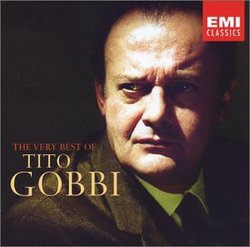| All Artists: Tito Gobbi, William Dickie, Ruggero Leoncavallo, Wolfgang Amadeus Mozart, Gioachino Rossini, Gaetano Donizetti, Francesco Cilea, Umberto Giordano, Ermanno Wolf-Ferrari, Giacomo Puccini, Giuseppe Verdi, Tullio Serafin, James Robertson, Alceo Galliera, Alberto Erede, Gabriele Santini, Umberto Berrettoni, Oliviero de Fabritiis, Georges Prêtre, Antonino Votto Title: The Very Best of Tito Gobbi Members Wishing: 0 Total Copies: 0 Label: EMI Classics Release Date: 9/2/2003 Genre: Classical Styles: Opera & Classical Vocal, Historical Periods, Classical (c.1770-1830), Modern, 20th, & 21st Century, Romantic (c.1820-1910) Number of Discs: 2 SwapaCD Credits: 2 UPC: 724358509625 |
Search - Tito Gobbi, William Dickie, Ruggero Leoncavallo :: The Very Best of Tito Gobbi
 | Tito Gobbi, William Dickie, Ruggero Leoncavallo The Very Best of Tito Gobbi Genre: Classical
|
Larger Image |
CD Details |
CD ReviewsA great tribute for a truly great artist Dino Starcevic Rivera | San Josť, Costa Rica | 04/22/2007 (5 out of 5 stars) "If you want to know about Tito Gobbi, this is the set for you. Truly the very best of this phenomenal baritone, one of those rara avis in opera (both a great singer and a great actor). On both CDs, is Gobbi in his finest: from comedy (All'idea di quel metallo/Come Paride vezzoso) to tragedy (Nemico della Patria), from grand opera (Cruda, funesta smania) to verismo (Si puo?). The first CD includes some selections of less known operas (such as Zazà, Fedora, I gioielli della Madonna or L'arlesiana) that adds value thanks to Gobbi's artistry. But it is truly on the second CD where Gobbi shines as the powerful artist he was. Devoted entirely to Giuseppe Verdi's incredible rols for baritone, track after track Gobbi reveals himself as one of the milestones in opera; his deeply emotional approach of Di Provenza il mar (La Traviata) and A tal nome palpito (Simon Boccanegra) matches perfectly with the grandeur of Eri tu (Un ballo in maschera) or Dio che nell'alma infondere (Don Carlo), and chilling Pietà rispetto amore (Macbeth) and Iago's Credo (Otello). Cherry over the cake: his portrait of Falstaff... Do not miss this album. Not only a excellent tribute to Gobbi, but also one of the best double sets of The Very Best series of EMI." Why is Gobbi considered to be the 'King of Baritones'. Abel | Hong Kong | 01/11/2010 (5 out of 5 stars) "He IS still so, despite the passage of time and the emergence of countless newcomers.
Why? This dual CD set provides some clue. In more sense than one, this album is an ear opener. I've been listening to quite a number of 'historical' recordings of Gobbi's - chiefly with Maria Callas and Giuseppe Di Stefano. Complete operas. Then quite a number of his later collaborations with Gencer, then Suliotis, etc. However, this album gives me the opportunity to hear Gobbi in a much wider spectrum. Well, there are currently quite a large number of good to great baritones around. However, in terms of all-rounded artistry (i.e. from bel-canto to Verdian and verismo), Gobbi still appears to be unsurpassed. If you think that he is but a Verdian or verismo baritone, listen to his buffo bel-canto techniques that virtually blows the listener away. The second aspect is Gobbi's characterisation. He sings beautifully almost 100% of the time, but this 'beautiful' aspect NEVER rose above his characterisation. This latter aspect has been taken too much for granted these couple of decades back, culminating in an almost 'beautiful nonsense' operatic culture that baffles every serious listener. If you want to know what is idiomatic Italian opera singing in full fledge, this album is for you." |

 Track Listings (19) - Disc #1
Track Listings (19) - Disc #1